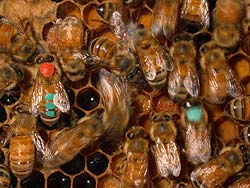UMHS study finds inaccurate, old information on nearly one-third of Web sites
Unlike more common cancers like breast cancer, prostate cancer or melanoma, few people understand the basic facts about what causes bladder cancer and how it is treated. So when patients are diagnosed with bladder cancer, they often turn to the Internet for information.
But a new study by researchers at the University of Michigan Health System found 32 percent of Web sites about bladder cancer cont
Scientists at UCSF’s Ernest Gallo Clinic and Research Center have identified a single brain protein that can account for most of the intoxicating effects of alcohol. The finding pinpoints perhaps the best target yet for a drug to block alcohol’s effect and potentially treat alcoholism, the scientists say.
The mechanisms by which alcohol acts on the brain are thought to be similar throughout the animal kingdom, since species from worms and fruit flies to mice and humans all become
Cells may help researchers in skin and hair therapies; tool can be used to find other body stem cells, including cancer stem cells
Researchers at the Howard Hughes Medical Institute at The Rockefeller University have discovered a new method to track and isolate elusive stem cells. The new animal model they developed was successfully tested by isolating and characterizing skin stem cells, but may also be valuable in searching for stem cells that produce the cells of the heart, pancreas
A research team at the University of Chicago has discovered a crucial signaling pathway that controls the growth of nascent nerves within the spinal cord, guiding them toward the brain during development.
The study, published in the Dec. 12, 2003, issue of the journal Science, solves a long-standing scientific mystery. It may also help restore function to people with paralyzing spinal cord injuries.
“This is the first guidance mechanism that regulates growth of nerve cells up and

A new computer vision system for automated analysis of animal movement — honey bee activities, in particular — is expected to accelerate animal behavior research, which also has implications for biologically inspired design of robots and computers.
The animal movement analysis system is part of the BioTracking Project, an effort conducted by Georgia Institute of Technology robotics researchers led by Tucker Balch, an assistant professor of computing.
“We believe the language o
Scientists have found that, despite a vast difference in precipitation between the north and south sides of the Himalaya Mountains, rates of erosion are indistinguishable across these mountains.
Douglas Burbank, professor of geology and director of the Institute for Crustal Studies at the University of California, Santa Barbara, is the first author of the article, “Decoupling of erosion and precipitation in the Himalayas,” to be published Thursday, December 11, in the international scientif